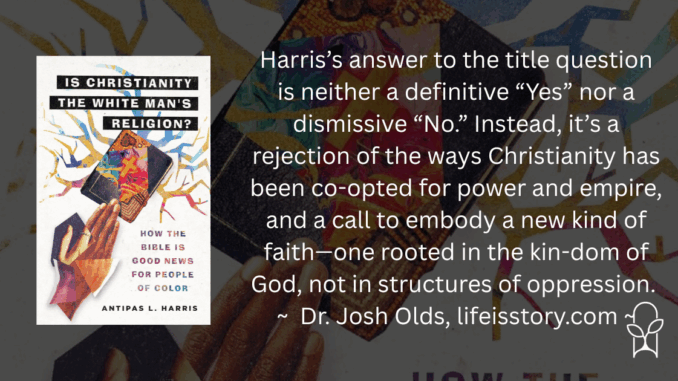
Published by IVP on May 20, 2025
Genres: Non-Fiction, Racial Reconciliation
Buy on Amazon
Goodreads

Among many young people of color, there is a growing wariness about organized religion and Christianity in particular. If Christianity is for everyone, why does the Bible seem to endorse slavery? Why do most popular images of Jesus feature a man with white skin and blue eyes? Is evangelical Christianity "good news" or a tool of white supremacy? As our society increases in ethnic and religious diversity, millennials and the next generation of emerging adults harbor suspicions about traditional Christianity. They're looking for a faith that makes sense for the world they see around them. They want to know how Christianity relates to race, ethnicity, and societal injustices. Many young adults have rejected the Christian faith based on what they've seen in churches, the media, and politics. For them, Christianity looks a lot like a "white man's religion." Antipas L. Harris, a theologian and community activist, believes that biblical Christianity is more affirmative of cultural diversity than many realize. In this sweeping social, theological, and historical examination of Christianity, Harris responds to a list of hot topics from young Americans who struggle with the perception that Christianity is detached from matters of justice, identity, and culture. He also looks at the ways in which American evangelicalism may have incubated the race problem. Is Christianity the White Man's Religion? affirms that ethnic diversity has played a powerful role in the formation of the Old and New Testaments and that the Bible is a book of justice, promoting equality for all people. Contrary to popular Eurocentric conceptions, biblical Christianity is not just for white Westerners. It's good news for all of us.
Is Christianity the White Man’s Religion? Antipas Harris first heard that question when it interrupted his lecture on a graduate course in ministry leadership. “What do you say to your friends who are leaving the church and arguing that Christianity is the white man’s religion?” a student asked. Harris didn’t have the answer, but it was a question that lingered with him and resulted in this book. Christianity was birthed in the Middle East, founded on the death and resurrection of a brown-skinned Palestinian, and took root in Africa for centuries before the European peoples adopted into their culture. But today, particularly in the West, Christianity can be seen as the religion of colonizers and invaders. To Black folk, descendants of enslaved peoples whose enslavers claimed a Christian message, it is altogether understandable that Christianity be seen as the religion of the oppressor.
Antipas Harris breaks down his book into four parts. The first part sets up how the question has been asked and answered within the Black community in America over the past century. He details how Black-empowered groups like The Nation of Islam and Black Hebrew Israelites are able to gain a religious foothold, especially among young Black men, with their community and culture that creates identity and belonging. He speaks about the failure of the American church overall—and the evangelical church in particular to address the issues of injustice and loss of identity facing the nation. There’s a strong case to be made that while Jesus is appealing, the Christianity of America is not.
The second part moves through the historical (and contemporary) misreadings of Scripture that paint Jesus with a white, Europeanized brush and attempt to justify the injustices of slavery and racism. Harris doesn’t break new ground, but that’s only because the same old, tired, and debunked readings of Scripture continue to be prevalent. It’s 2025. We should have moved past this “curse of Ham being Black” nonsense. But here we are. Is Christianity the White Man’s Religion traces how Christianity because the White Man’s religion and how that religion became the civic religion of European empire.
Part three corrects the misreading of Scripture and presents to us a Christianity that is deeply concerned about caring for folks from different cultures. Harris presents diversity as a key component of the early church. He makes a strong case for rooting social justice in the Gospel and shows how, throughout Scripture, God is seen as having a particular case for those empire oppresses. But Is Christianity the White Man’s Religion isn’t meant primarily to call white Christians out of their farcical Christianity, but rather Harris’s tone and emphasis is on calling Black Christians to look away from the farce and into the real thing. Because the truth is that the Westernized, white, empire-loving expressions of Christianity are indeed the White Man’s religion—but that’s not the faith to which the brown-skinned Jesus of Nazareth is calling us. Harris strips the generations of whitewash off of Jesus and Christianity and calls all people—but particularly his Black and Brown brothers and sisters to the multi-ethnic faith in a God who understand their perspective.
In the final chapter, Harris synthesizes his argument: the answer to the title question is neither a definitive “Yes” nor a dismissive “No.” Instead, it’s a rejection of the ways Christianity has been co-opted for power and empire, and a call to embody a new kind of faith—one rooted in the kin-dom of God, not in structures of oppression. His conclusion resounds with prophetic clarity: Christianity does not belong to whiteness, colonization, or empire. It is a global, liberative faith, particularly for the oppressed.
